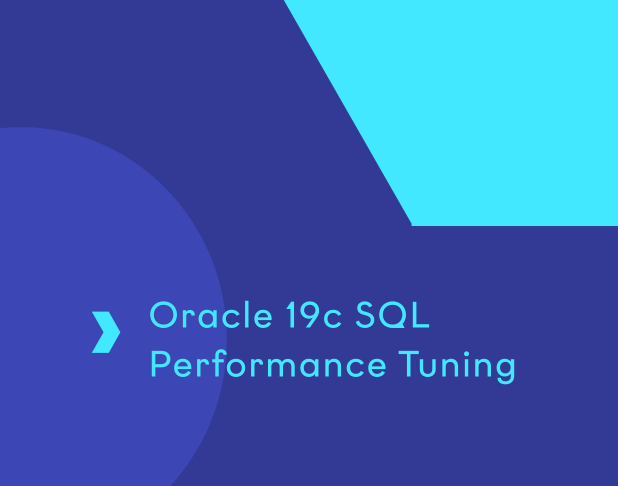Develop your ability to optimise SQL in Oracle 19c by learning key techniques for assessing and improving query performance. Through practical examples and real-world tools such as execution plans, SQL trace and tuning advisor, you’ll gain valuable experience that supports application efficiency.
March sale - up to 50% off training courses – use code: EARLY0326USA
Oracle 19c SQL Performance Tuning
Select your learning method

Optimising SQL Performance in Oracle 19c
In just two days, you’ll learn how to diagnose and resolve SQL-related slowdowns in Oracle 19c environments. Gain practical insight into query tuning methods and tools that improve database responsiveness. This course strengthens your understanding of performance challenges and gives you the skills you need to apply tuning strategies with confidence.
- Explore Oracle’s tuning workflow and goals
- Interpret query execution with explain plan
- Detect and fix slow-running statements
- Improve access speed with indexing techniques
- Evaluate queries using Autotrace and SQL Trace
- Maintain accurate optimiser statistics effectively
- Navigate SQL Developer’s tuning advisor tools
- Apply hints to shape execution paths
- Optimise joins for better performance
- Avoid common efficiency issues in queries
What you’ll learn
On this course, you’ll learn how to review and optimise SQL execution in Oracle 19c. You’ll explore tuning strategies, use diagnostic tools like SQL Trace and tuning advisor, and apply indexing techniques to improve query efficiency and support better performance across Oracle-based applications.
Understanding the optimiser
Ever wondered how Oracle decides the best way to run your SQL? This session explains how the optimiser works and what influences the choices it makes. You'll look at rule-based vs cost-based optimisation, explore the role of OPTIMIZER_MODE, and learn how Oracle calculates cost. We’ll also cover dynamic sampling, adaptive optimisation and how to spot when Oracle rewrites your queries. By the end, you'll know what’s really going on behind your execution plans, and how to work with it, not against it.
Join operations and access paths
When performance drops, joins are often to blame. We’ll look at how Oracle handles different join types, from nested loops and hash joins to star joins and merge joins, and when each is used. You’ll explore the access paths Oracle considers, how indexes fit into the picture, and how partitioning or statistics might influence the plan. This session also gives you the insight to optimise joins and data access methods for better, faster queries.
Hints, views and transformation
Sometimes, Oracle needs a gentle nudge, and that’s where hints come in useful. You’ll learn how to guide the optimiser with hints to control join order, force index use, or switch access paths. We’ll also explore how views and inline views behave in a tuning context: when they're merged, when they're materialised, and how the WITH clause plays in. This section gives you the tools to take back control when Oracle’s default plan isn’t the best one.
- Two days of training in a live virtual classroom
- Interactive hands-on live labs
- All relevant course materials
- Certificate of attendance
Key facts
Ideal for developers, support staff and technical professionals with SQL experience who need to improve the performance of Oracle 19c applications through effective query and database tuning techniques.
You must have completed the Oracle SQL course before taking this one.
Our experienced trainers and interactive labs create a focused, practical environment – so you can put theory into practice from day one.
FAQs
This interactive course guides you through analysing and refining SQL within Oracle 19c systems. Using real scenarios and applied techniques, you’ll develop the confidence to resolve performance issues and enhance the efficiency of database-driven applications.
Who should attend the Oracle 19c SQL Performance Tuning course?
This course is designed for SQL developers, application programmers, database designers and technical support staff working with Oracle databases who need to optimise the performance of SQL statements in Oracle 19c environments.
How do indexes improve SQL performance in Oracle 19c?
Indexes allow Oracle to retrieve data faster by reducing the need for full table scans. This course explores different index types including B*Tree, bitmap, and function-based indexes, and shows when and how to use them effectively.
What practical skills will I gain from this course?
You’ll learn to identify inefficient SQL, interpret execution plans, use tuning tools, improve indexing strategy and apply hints effectively. These skills help you troubleshoot and tune real-world Oracle 19c database applications.
What our customers say

"The lecturer was amazing - so passionate and knowledgeable, which made the sessions really enjoyable and easy to follow. I learned a lot and felt supported throughout. I would definitely consider returning for future sessions and highly recommend ILX training to my colleagues."

"Always good courses from ILX. Tutor explained the course very well."
Join the half a million learners developing their skills with our training
A trusted partner to thousands of organisations worldwide
Our passionate team goes above and beyond to support customer needs
Please complete the form to ensure your quote is accurate and we will contact you soon.